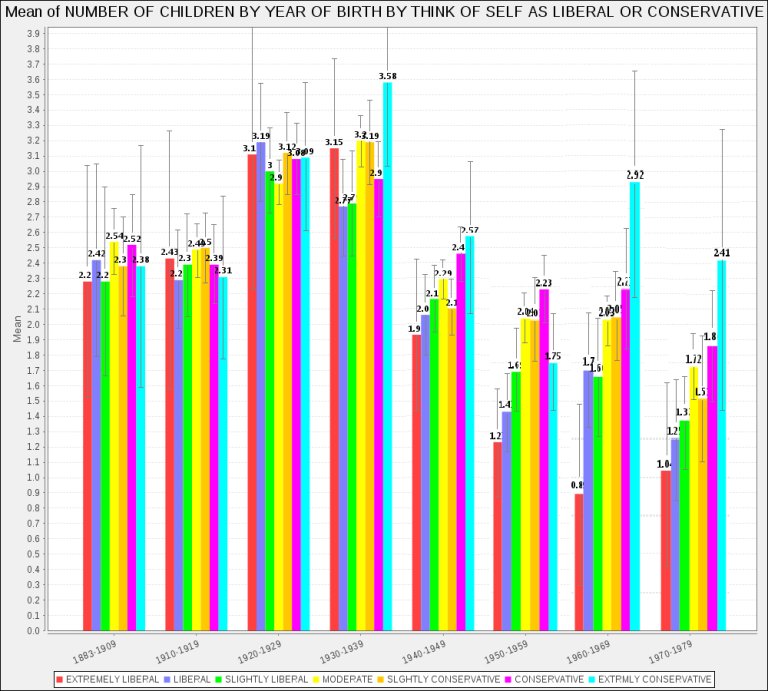The Long View 2006-08-28: Resentment, Stupidity, Pigeons, & Statistics

The trend John mentions here, that people who see themselves as conservative have more kids than people who see themselves as liberal, has only accelerated. Although, genetic determinist that I am, it is still possible that having kids tends to push you more conservative than you otherwise would be.
Resentment, Stupidity, Pigeons, & Statistics
The Interstate Compact on Electoral Reform is making progress, laments Pete du Pont in today's Opinion Journal:
[L]ast week the California Senate passed legislation to award the state's Electoral College votes to the candidate who has received the most popular votes nationally--whether Californians chose him or not. A similar bill passed the Assembly on May 30, so it will soon be up to Gov. Arnold Schwarzenegger to sign or veto the bill. Such a bill also passed the Colorado Senate in April, part of a national [campaign] to change the way we choose our presidents. The mandate doesn't take effect until enough other states sign on to provide a majority of electoral votes.
As I have remarked before, and will no doubt do again, I am at a loss to understand why conservatives in general and Republicans in particular would oppose this measure: they are supposed to be the popular party, after all. The piece by du Pont is a catechism of misapprehensions:
First, the direct election of presidents would lead to geographically narrower campaigns, for election efforts would be largely urban.
Certainly it would make the Midwest less important. However, as Democratic strategist Thomas Schaller has observed, Midwestern has the loosest party affiliation of any region of the country. That gives the Democrats hope, and should give the Republicans pause about just how reliable the electoral votes of those states are.
In any case, the argument that the reform would urbanzie electoral issues. Not even the dimmest Republican would make a major effort to wrest New York or Los Angeles from the Democrats. What a smart Republican would want, however, is an opportunity to campaign in the suburban, exurban, and rural regions of the states with Democratic majorities. That would make a big difference not just for presidential campaigns, but also for congressional races.
Second, in any direct national election there would be significant election-fraud concerns.
Fraud was an issue in 1960, 2000, and 2004 precisely because the present divorce between the electoral college result and the popular vote made vote-rigging in key states obviously advantageous. There was no major fraud in any of those cases, but the system invited suspicion of fraud. Under the reform system, there would be no key states, and therefore no special incentive anywhere to cheat.
Third, direct election would lead to a multicandidate, multiparty system instead of the two-party system we have.
A system of proportional representation does this to a legislature. The point is irrelevant to a presidential voting system, which choses a single official (well, two: president and vice president).
Finally, direct election would also lead to weaker presidents...the highest percentage winner, no matter how small (perhaps 25% or 30% in a six- or eight-candidate field) would become president.
Presidents elected by pluralities are a product of the electoral college system already. We should remember that the College would still exist under the reform; the electoral votes would just be assigned differently. This is, actually, one of the reasons for retaining the Electoral College. It is convenient to have a system that turns pluralities into majorities, something that happened numerous times in the 20th century. It would continue to happen occasionally under the reform. In any case, no president is weaker than one who takes office despite the popular vote.
We should remember that the Constitutional Convention thought they were creating a system under which the Electoral College would normally select the president; they assumed that popular vote in the states would go to favorite sons, leaving the electors free to choose on late ballots. By the 1820s, though, presidential races were regarded as essentially popular votes. Today, of course, an Electoral College vote that contradicts the popular vote is not regarded as fully legitimate.
* * *
Conservatives are more fertile than liberals, according to a piece by Arthur C. Brooks that we noted last week. Now comes Half Sigma (hat tip to Danny Yee) to parse the same numbers and point out that Democrats have more children than Republicans. There is no real discrepancy, however, and Half Sigma notes:
How is it possible that conservatives have more children but Republicans have fewer children? Well the answer is that there is not a perfect correlation between political party and whether a voter identifies himself as “liberal” or “conservative.” Furthermore, a plurality of respondents identified themselves as “independent.”
Not content with making this unexceptionable point, Half Sigma then, perhaps, goes beyond the evidence:
The trend in the United States is that poor, religious, and stupid people are having more children, while rich, secular, and smart people are having fewer children.
It's an odd definition of intelligence that identifies it as a characteristic of a population whose behaviors are causing it to become extinct. One is reminded of Schopenhauer's belief that the human brain is a useless fruit, just a bit of biological hypertrophy, and thought just another bodily function.
* * *
Some support is lent to this theory by AI, once we understand the technology behind Google's great results:
As a Google user, you're familiar with the speed and accuracy of a Google search. How exactly does Google manage to find the right results for every query as quickly as it does? The heart of Google's search technology is PigeonRank™, a system for ranking web pages developed by Google founders Larry Page and Sergey Brin at Stanford University.
And why do you never see a baby pigeon? The pigeons you see are the baby pigeons.
* * *
Returning to stupidity (as if we ever left it) we have this explanation by the friendless Spengler about its relationship to American Idolatry:
Some readers have asked whether Americans are quite free from idolatry. The answer is: of course not.
The resentful country folk [of the agriculturally depressed 1920s and 1930s] formed the first audience for the now-dominant style in American music...The object of high art is to lift the listener out of the misery of his personal circumstance by showing him a better world in which his petty troubles are beside the point. ...Resentment is simply an expression of envy, the first and deadliest of sins....Why reject what comes from on high to worship one's own image, unless you resent the higher authority? ....The culture of resentment runs so deep in the American character that the self-pitying drone of immiserated farmers, amplified by the petulant adolescents of the 1950s as a remonstration against parental authority, now dominates the musical life of American Christians. ...This helps explain why Americans are so stupid. ...One learns only by accepting a suitable authority. If one rejects authority in favor of one's own impulses, one cannot learn.
Resentment is what motivates folk who drag musicologists from their offices to be publicly humiliated in struggle sessions before sending them to the countryside to learn from the music of the people. America, in contrast, is covered with amateur orchestras, scolas, and motet ensembles from sea to shining sea. The cultural tick is the reluctance to state as matter of fact that Mozart is better than Madonna.
* * *
Making a related point, we find The Belmont Club critiquing Niall Ferguson's latest at Foreign Affairs, entitled "The Next War of the World":
[Ferguson says] Events in Iraq suggest that there, too, what is unfolding is not a clash between the West and Islam but, increasingly, a clash within Islamic civilization itself. By some accounts, ethnic disintegration there is already well under way
And the only power that can moderate these destructive tendencies is the only power that has no political appetite for empire..France and Iran, to name just two powers, may have the appetite for empire but not the teeth. And America by contrast and despite Niall Ferguson's longing for a strong hand in the world, may have the teeth but not the appetite. If the European Union project could be called putting a French jockey atop a German horse, the attempt to create an "international" world order might be described as a scheme to harness American muscle to a transnational agenda. Unfortunately and to the everlasting resentment of internationalists, the US refused to put its economy and military at the service of its environmental, cultural and political projects.
Eventually blame for the ruin of Kyoto, the UN and probably the EU -- those shining international palaces in the sky -- will probably be put down to American reluctance to play along. As Eros said in Plan 9 from Outer Space to the earthlings after they refused to appreciate the brilliance of his scheme to turn the dead from Southern California cemeteries into zombies: "You see? You see? You're stupid minds! Stupid! Stupid!"
One could argue with some of these points, but references to Plan 9 from Outer Space should always be encouraged.
Copyright © 2006 by John J. Reilly




Comments ()